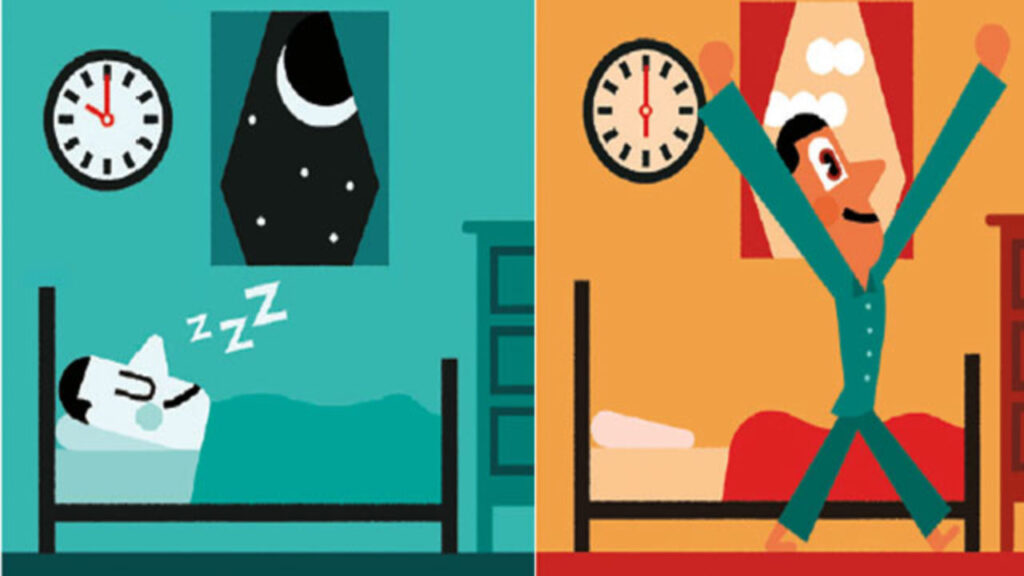Benjamin Franklin’s quote, “Early to bed, early to rise makes a man healthy, wealthy and wise” aptly sums up the importance of sleep in our lives. Feeling rested after a good night’s sleep is just as important as maintaining a sleep schedule. If people do not get proper sleep they usually “wake up on the wrong side of the bed”. Therefore, taking on hectic tasks or dealing with people on a sleep deprived day might be a bad idea.
According to studies, children must sleep for 9 to 10 hours and adults must sleep for 8 hours. Unfortunately, 33% of the world’s population is affected by sleep deprivation which in turn affects their health.
It is no doubt that lack of good sleep affects one’s physical health but it also affects their mental health. Sleep deprivation has been observed to induce a more hostile, irritable, unproductive and angry mood. A study conducted by Dov Zohar and his colleagues in 2005 on medical residents concluded that sleep deprived people are less likely to experience positive emotions for their own achievements.
Impacts of Reduced Sleep
Insomnia and disturbed sleep were initially viewed as symptoms of psychological disorders. But ongoing research now suggests that sleep and mental health have a bidirectional relationship. Insomnia (lack of sleep), hypersomnia (excessive sleep) or disturbed sleep could initiate and aggravate mental health issues, at the same time, they could be the symptoms of psychological disorders such as depression, attention deficit hyperactivity disorder (ADHD) and post traumatic stress disorder (PTSD).
During the process of sleep, our brain goes through different stages that make up the sleep cycle. Each of those stages contributes to the brain’s health and mental process of memory, thinking, learning, etc. These processes further maintain the emotional and mental health of the individual. Hence any change in the stages of sleep may cause and consequence severe mental health and neuro-developmental problems.

Fix your sleep schedule for better mental health.
Explore reasons for poor sleeping patterns.
Conditions Related to Disturbed Sleep
Sleep may seem like an option but there are certain specific mental health problems closely related to sleep:
- Stress: Daily hassles tend to stress us out, with addition of sleep deprivation, minor stress advances to frustration.
- Depression: Insomnia and hypersomnia have always been symptoms of depression. According to studies now, these symptoms induce and aggravate depression. The people treated with cognitive behavioral therapy (CBT) for insomnia and hypersomnia have reported reduced depression.
- Anxiety: The fear and worry in anxiety disorders continuously makes a person feel “on guard”. This feeling of being “on guard” is known as a hyper-arousal state of mind which is one of the primary reasons for insomnia. And in turn, insomnia causes anticipatory anxiety during bed time.
- Bipolar Disorder: People with bipolar have patterned switches from manic episodes to depressive episodes. There has been an observation that, as the episodes change, the sleeping pattern of the person changes. During the switch, the person goes through insomnia which aggravates the on-coming episode. Treatment for insomnia has been noted to reduce the severity of bipolar disorder.
- Attention Deficit Hyperactivity Disorder (ADHD): Usually diagnosed in children and persisting in adults, ADHD is accompanied by inability to fall asleep, frequent awakenings, excessive daytime sleep, sleep-breathing issues.
Resolve Sleep Issues
In case of severe sleep issues, it is recommended for one to approach a psychologist, psychiatrist or psychotherapist. Apart from professional help, one can make a few changes to regulate their sleep schedule, such as:
- Have a fixed bed time daily.
- Avoid napping during the day. In case of fatigue, naps of 30 minutes during the day are sufficient.
- Avoid energy inducing drinks such as coffee, soda or energy drinks in the evening.
- Distance your gadgets (phone, laptop, TV) before getting into bed. If you are unable to sleep once in bed, read yourself to sleep.
- Have a fixed routine before bedtime, a hot shower, meditation, relaxation exercises, reading time, etc.
- Make sure your bedding is comfortable.
Regarding therapy for sleep related issues, the on-going modification in CBT related to insomnia, known as CBT-I has been proven effective in reducing sleep problems and further reducing symptoms of mental health conditions.
Good sleep is an integral part of a healthy mind and healthy body. Do you feel you have disordered or inconsistent sleep patterns? Find out by taking the FREE Sleep Quality Checker Quiz here.
If you feel like you need help with your sleep and/or mood, reach out to us for a free consultation. We’re here to listen.
To learn more about our offerings and plans, click here.
Read More:
How is sleep associated with mood?
Yoga: Does the Ancient Practice Have Psychological Benefits?
Okay Google, Play Me a Song – The Effects of Music on Mood and Stress







